Honest politics tops public expectations
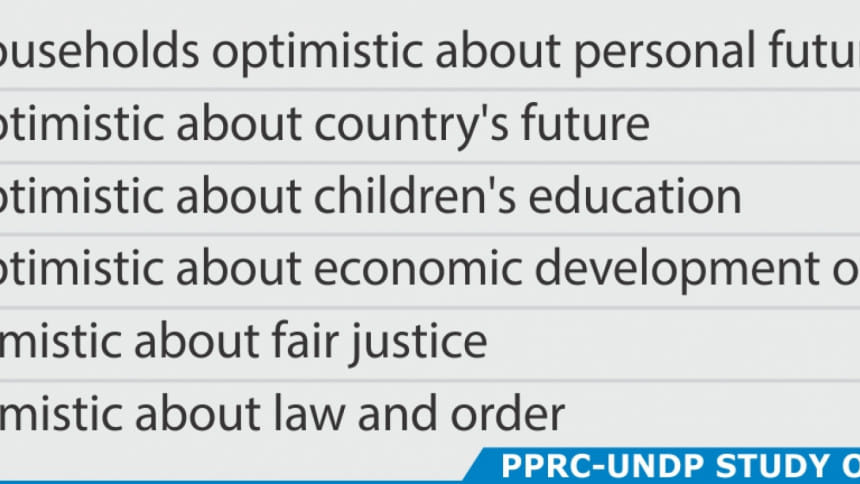
Less than half of the people surveyed by the Power and Participation Research Centre (PPRC) said they were optimistic about their individual future, prompting calls for an improvement in political governance and establishment of the rule of law.
Only 10.1 percent expressed confidence that the country's political situation would improve.
The survey was conducted last year over 1,500 households in Dhaka city, 17 municipalities and 33 villages covering 45 districts.
The findings of the study carried out by the PPRC and commissioned by the United Nations Development Programme, were shared at a policy dialogue on “Challenges of political development and sustainable growth: costs and consequences of political conflicts in Bangladesh” at the UNDP office in the capital yesterday.
The survey shows 29.3 percent hopeful about the status of women and 18.2 percent about livable cities.
Institutions -- both government and non government -- should work hard to improve their image, as the study report gives a gloomy picture of how general people perceive them.
Only 8.6 percent city dwellers in Dhaka have strong trust in the Election Commission while the percentage in other urban areas is 12.4 and in rural areas 12.1.
About 14.8 percent respondents have strong faith in the administration and 14.2 percent in the police.
One-fifth of the people surveyed have trust in local governments while 11 percent support political leadership and parties.
The Bangladesh Army gets the highest 60.2 percent approval of residents in the capital while 54 percent respondents expressed strong trust in the education system that has come under question in recent times.
Fifteen percent respondents in Dhaka city have faith in the civil society while 42.6 percent in the print media and 46.8 percent in the electronic media.
About 15.8 percent respondents in Dhaka city admitted to paying bribes in the last three years, while it is 13 percent in other urban areas and 14.2 percent in rural areas.
Of those who paid bribes, 64.9 percent in Dhaka did so to protect themselves from harassment.
Honest and reformed politics topped the list of people's expectations. Other expectations, in order, are fair and peaceful elections, political compromise, no political violence and strengthening of grassroots politics.
“The governance agenda needs rethinking,” said Hossain Zillur Rahman, executive chairman of the PPRC. He called for looking into conflicts of interest in economic governance, grievance redress and time-bound service delivery.
With business going as usual, Bangladesh would not be able to achieve Sustainable Development Goals (SDGs) and its target of becoming a middle income nation, Zillur said.
Speaking at the programme, HT Imam, political affairs adviser to the prime minister, said issues such as non-performance and capital flight and problems in the banking sector were putting the government into trouble.
“The government has done good things but has failed to communicate those properly to the people.”
Mustafizur Rahman, executive director of the Centre for Policy Dialogue, said the country had to move from issue-centred policy to systemic policy.
Badiul Alam Majumder, secretary of rights organisation Shushashoner Janney Nagarik, said Bangladesh had under-performed though it had potential.
“The weakness in politics is keeping us behind.”
The civil society activist said institutions had become weaker, pulling back the country. The civil society organisations are also divided.
Former Bangladesh Bank governor Salehuddin Ahmed said political space at both national and local levels had been narrowed down following 2014 general elections and recent union parishad elections.
People need to own development. “If they don't own a project, there will be no social audit and there will be corruption,” he added.
Salehuddin, now a professor of business at Brac University, said quality of economic growth is important for improving the living standards.
“Growth should embrace all strata of people.”
Democracy, good governance and development are interrelated and keys for sustainable growth. “We also need to reform institutors as they are very weak,” the former BB governor said.
Zarina Rahman Khan, a professor of public administration at Dhaka University, said governance is a key issue but political governance is becoming a binding constraint for development.
Bangladesh has institutions but they cannot deliver desired results because of resistance standing in the way of their development, she added.
Pauline Temesis, country director of the UNDP, said, “Ensuring a balance between development and democracy is possible with solid evidence-based results.”
The study is a starting point for further discussion, and the SDGs will be a key anchor in moving forward the discussion, she said. “Quality matters for the development.”
Robert Watkins, resident representative of the UNDP Bangladesh, who moderated the dialogue, said the UNDP commissioned the study to examine the impact of governance on economic development.
“The goal is clear but the path remains a challenge.”

 For all latest news, follow The Daily Star's Google News channel.
For all latest news, follow The Daily Star's Google News channel. 

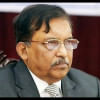
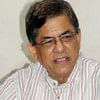
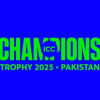
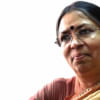
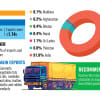

Comments